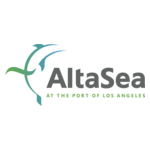UCLA’s Institute for Carbon Management to Demonstrate Carbon Removal Technologies on AltaSea Campus at Port of Los Angeles
LOS ANGELES–(BUSINESS WIRE)–AltaSea and the UCLA Samueli School of Engineering’s Institute for Carbon Management (ICM) have announced an agreement to demonstrate carbon removal technologies on the 35-acre AltaSea campus at the Port of Los Angeles later this year. ICM will showcase its pioneering SeaChange technology that leverages the oceans to effect carbon removal. This innovative technology will help address one of the most daunting climate change challenges the world faces — carbon dioxide emissions.
ICM’s carbon dioxide removal process uses renewable electricity to entrap carbon dioxide found in seawater in the form of inert, solid carbonates and dissolved bicarbonate ions. This process allows durable, permanent and energy-efficient carbon removal. In order to combat the effects of climate change, it is estimated that 10-20 billion metric tons of carbon dioxide will need to be removed each year beginning 2050, ICM is poised to rapidly upscale and commercialize its innovative technology to expand the world’s carbon dioxide removal capabilities.
“AltaSea’s mission is to convene the best and brightest that are fighting climate change through innovative technology, and ICM’s carbon removal technology is a gamechanger in our global fight against climate change,” said AltaSea President & CEO Terry Tamminen. “We are excited to have them on board and be able to help foster the development and growth of breakthrough technologies that can have positive, impactful change on our planet.”
AltaSea is the West Coast’s largest blue economy research and development center, creating new well-paying jobs, tackling climate change, and working to solve some of the most pressing issues in the marine environment. In addition to UCLA, AltaSea’s current and planned tenants include the University of Southern California, the Southern California Marine Institute (made up of 23 universities, colleges, and institutes), Braid Theory, Holdfast Aquaculture, Montauk Technologies, and Pacific Mariculture.
AltaSea is also home port to famed oceanographer and explorer Dr. Robert Ballard’s Ocean Exploration Trust (OET) and the research vessel Nautilus. Dr. Ballard is best known for his historic discoveries of hydrothermal vents, the sunken R.M.S Titanic, the German battleship Bismarck, and many other shipwrecks around the world. OET plans to build a 10,000 square foot interactive research and educational center at AltaSea.
“AltaSea’s campus is California’s hub for the blue economy, and there is no better place in North America for UCLA’s Institute for Carbon Management to demonstrate its pioneering SeaChange technology,” said ICM Director and civil and environmental engineering, and materials science and engineering professor, Gaurav N. Sant.
Dante Simonetti, ICM’s Associate Director for Technology Translation, will also join in the effort. “The next decade is crucial to scale up, scale out and commercialize carbon management technologies,” said Simonetti, who is an assistant professor of chemical and biomolecular engineering at UCLA Samueli. “Access to, and partnership with, world-class demonstration sites like AltaSea is a prerequisite for our success.”
About AltaSea at the Port of Los Angeles
AltaSea at the Port of Los Angeles, located on 35 acres at North America’s leading seaport by both container volume and cargo value, is dedicated to accelerating scientific collaboration, advancing an emerging blue economy through business innovation and job creation, and inspiring the next generation, all for a more sustainable, just, and equitable world.
For more information on AltaSea, please see our website: https://altasea.org.
About UCLA’s Institute for Carbon Management
The Institute for Carbon Management (ICM) is a cross-campus technology-translation entity at UCLA that engineers carbon management solutions for a sustainable tomorrow. ICM transforms pioneering carbon management solutions from the laboratory/bench-scale to pre-commercial/commercial-scale devices, prototypes and software solutions. The institute is organized into cross-disciplinary project teams with expertise from across the globe. These collaborations have enabled UCLA to become the first university-led team in the world to win many global contests, such as an XPRIZE in April 2021 (grand prize in the NRG COSIA Carbon XPRIZE competition) and the 2021 Liveability Challenge in Singapore. ICM’s technologies are now being commercialized via UCLA startup companies including CarbonBuilt, Concrete-AI and SeaChange.
Contacts
Jacob Scott
jscott@vectisstrategies.com
412-445-7719



